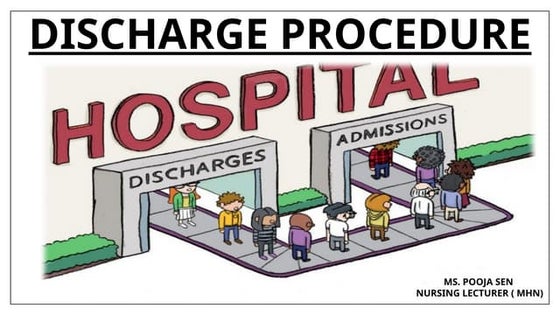Educators as Game Designers Workshop - 1
Download as PPTX, PDF0 likes168 views
This document discusses how educators can design games for learning. It begins by defining what makes something a game, noting they usually have goals, rules, feedback, and voluntary participation. It then discusses four categories of games and learning: games in education, repurposing non-educational games, gameful learning which takes inspiration from good games, and game-based learning which designs games for specific learning goals. The document emphasizes how games keep people engaged through constant feedback, challenges at an appropriate level, collaboration, and flow. It suggests educators can apply these principles when creating their own educational simulations.
1 of 24
Download to read offline
























Recommended
Educators as Game Designers Workshop - 3



Educators as Game Designers Workshop - 3Bernard Bull
╠²
The document discusses embracing the role of game designer and provides guidance on designing educational games. It defines key elements of games, such as goals, rules, feedback, and voluntary participation. Tips are provided for game design, such as starting small and involving students. A process for 15-minute game design is outlined that includes defining the learning goal, story, game goal, rules, and feedback system. Principles of educational simulations are presented, such as having a theme, clear goal, challenges, and providing frequent feedback. Questions are provided to guide the design of an educational simulation or scavenger hunt. The importance of play and its role in learning and development is emphasized through a Benjamin Franklin quote.Game-based Learning



Game-based LearningMan Su
╠²
The document discusses using games in the classroom to promote learning. It outlines several benefits of games including cultivating a growth mindset in students by allowing them to learn from failure and practice skills. Games provide goals, feedback and a way to track progress. They can also leverage intrinsic motivation by promoting autonomy, belonging and creativity. The document then discusses digital game creation tools and has attendees try out games and design their own games to see how they could be used for learning or assessment.CreativeCulture Remixing play with Playful Design Thinking



CreativeCulture Remixing play with Playful Design ThinkingJacey-Lynn Minoi
╠²
This document discusses how play and games can be used to develop important 21st century skills like computational thinking, collaboration, creativity, problem solving, and critical thinking. It provides examples of how play was used to teach subjects in an engaging way. The document advocates remixing play into learning and outlines a 5-step process: 1) Empathize by understanding learner needs, 2) Define the problem, 3) Ideate potential play-based solutions, 4) Prototype ideas, and 5) Test prototypes. It then provides instructions for participants to work through this process by selecting a game and identifying its mechanics and strategies to design a "GamePlan" to address a theme or problem.Seriously fun



Seriously funJesse Schell
╠²
The slides that go with my "Seriously Fun" workshop at TTI Vanguard. (Some look ugly since pdf's don't support animations. Those aren't important.)Lessons from Game Design



Lessons from Game DesignJesse Schell
╠²
║▌║▌▀Żs from Jesse's keynote at MWUX 2015. How to apply game design principles to all kinds of design. Gamification: Four-Letter Word or Epic Win for Educators?



Gamification: Four-Letter Word or Epic Win for Educators?Daniel Stanford
╠²
The document discusses gamification and provides definitions and examples. It defines gamification as using game design elements in non-game contexts. It discusses the difference between extrinsic and intrinsic rewards and provides examples of each. While some criticize gamification as exploitation, the document argues we can use game elements like progression, mastery, autonomy, and surprise to help students feel and become more engaged and capable.Management games



Management gamesMona Liza
╠²
The document describes 3 management games to promote team building and problem solving skills. Game 1 has employees create marketing plans to sell random office items. Game 2 has employees take tissue paper squares and share personal facts in return. Game 3 challenges a group to lower a stick from waist level to the ground while maintaining contact, testing communication, planning, and concentration. The purpose is to encourage bonding, creativity, and evaluate how teams work together to solve problems.Game Based Learning As Education Reform



Game Based Learning As Education ReformAndrew Miller
╠²
This document discusses using game-based learning in education. It begins by defining some key principles of how games engage users in learning, such as providing situated learning experiences, allowing freedom to fail without penalty, and offering ongoing assessment with just-in-time feedback. The document then examines how these game principles can align with effective classroom practices when implementing game-based learning. Examples of game-based learning applications are provided, as well as resources for teachers on designing game-based lessons and analyzing the instructional elements of games.Pleasure Revolution Gsummit 2013



Pleasure Revolution Gsummit 2013Jesse Schell
╠²
Games will lead the way in the pleasure revolution because they are designed entirely for pleasure. Games provide clear feedback, a sense of progress, the possibility of success, mental and physical exercise, and a chance to satisfy curiosity and solve problems in a feeling of freedom. Pleasure is complex and contextual, involving discovery, thrill, fantasy, story, triumph, expression, challenge, and sensation. The five keys to motivational design are to make experiences appealing, engaging, effortless, uncheatable, and not embarrassing. Pleasure is the motivation for everything we do and the key to 21st century design. Designers can make experiences better by understanding guests and why and how they will like it more.Classroom Game Master



Classroom Game MasterLucas Gillispie
╠²
This document provides tips and tools for educators to create game-inspired learning experiences in the classroom. It discusses key elements of games like goals, rules, challenges and feedback. It encourages incorporating story elements, role-playing, choice, chance, and rewards into lessons. The document also provides examples of tools that can help, such as Google Apps, badging tools and classroom tools. It highlights an example of a teacher who created an engaging game for his students based on One Flew Over the Cuckoo's Nest. Overall, the document offers guidance on how to gamify lessons while rethinking assessment and having fun.Introduction To Game-Based Learning



Introduction To Game-Based LearningRandall Fujimoto
╠²
The document introduces game-based learning and discusses why it is effective for learning. It notes that game-based learning supports active, situated, and flow-based learning through continuous feedback and learning from failure. It also helps develop 21st century skills, social emotional learning, character skills, and a growth mindset. The document then outlines different types of game-based learning like educational games, video games, game design, new media gaming, and gamification. It provides examples for each type and concludes by quoting that "with games, learning is the drug."Gameful Learning - Using games & game strategies to engage learners



Gameful Learning - Using games & game strategies to engage learnersJason Rosenblum, PhD
╠²
Presentation on Gameful Learning at St. Edward's University. Designed for the 2011 SEU Teaching Showcase.Examining Reflective Awareness in Gaming Experience



Examining Reflective Awareness in Gaming ExperienceGames for Learning Institute (G4LI)
╠²
The document discusses using games to promote reflective awareness and testing game design as a tool for reflection. The researchers aim to support reflective experiences through games and gather feedback from players. Their mission is to support reflective experiences through games, gather feedback, and ensure the games remain fun. Their strategy is to design reflection into the gaming experience in a fun way, use the games as research instruments, and refine the games systematically based on feedback.Examining Reflective Awareness in Gaming Experience



Examining Reflective Awareness in Gaming ExperienceGames for Change
╠²
The document discusses using games to promote reflective awareness and testing game design as a tool for reflection. The researchers aim to support reflective experiences through games, gather feedback from players, and ensure the games remain fun. Their strategy is to design reflection into the gaming experience as a research instrument and use player feedback for systematic refinement. Some examples mentioned are embedding writing activities into educational games to promote social and private reflection. The researchers seek to contact players to discuss questions.The Development of a School Climate Game



The Development of a School Climate GameSeriousGamesAssoc
╠²
Claudia-Santi Fernandes, Associate Research Scientist | play2PREVENT Lab, Yale Center for Health & Learning Games | Schell Games and John Joy, Advanced Producer | Schell Games
Practice What You Preach: Strategies for a Positive Environment
Funded by the Chan Zuckerberg Initiative, the play2PREVENT Lab, Schell Games, and the Yale Center for Emotional Intelligence teamed up to develop a tool to measure school climate that was also a game empowering teens to take action and improve their school climate. Relatable stories throughout this digital experience allowed teens to navigate dilemmas in oneŌĆÖs school climate as well as strategize ways to address and make it better. Research shows that a positive school climate has a huge impact on the ability for a student to learn and achieve success. As our teams built out this digital experience, it was equally important for us to practice the many strategies within our process.
Can we take the same strategies and concepts to foster a positive working environment that acknowledges our differences and challenges, but sets the lens on bringing out the best in our own unique dynamic? In essence, can we practice what we preach?
Presented by the
Serious Play Conference
seriousplayconf.com
at
Montreal, Canada, Quebec,
UNIVERSIT├ē DU QU├ēBEC ├Ć MONTR├ēAL,
UNIVERSITY OF QUEBEC IN MONTREAL,
July 10-12, 2019The Secret Process for Making Games that Matter



The Secret Process for Making Games that MatterJesse Schell
╠²
The document discusses the process of designing transformational games. It addresses three key questions:
1) What change do you want to see in the learner? Examples include increasing knowledge, improving skills, or changing behaviors.
2) What activities lead to that change? Possible activities include receiving information, practicing skills, experimenting, solving problems, and reflecting.
3) How can gameplay facilitate those activities? The document provides examples of games that could teach medical diagnosis skills or financial literacy through simulated experiences and feedback.
The overall document provides a framework for designing games that aim to create meaningful change in players.Introducing SAGA



Introducing SAGALucas Gillispie
╠²
The document introduces Story and Game Academy (SAGA), which is an exploration of the learning potential of good video games. SAGA frames learning as gameplay by having students complete missions like building game levels, creating artwork or comics, and reviewing games to earn experience points both individually and as a team to unlock new mission types and games for the class.Guiding Principles For Teen Games



Guiding Principles For Teen GamesSeriousGamesAssoc
╠²
This talk shares insights identifying common qualities of games that may promote teen thriving with positive psychology practices. iThrive utilized a two-tiered approach to find these qualities and create a road map for developers to design for positive psychology practices. Experts at a series of think tanks, lead by McDonald, deconstructed the positive psychology concepts into guidelines for positive psychology constructs, both in terms of what systems and features might help and harm the promotion of these practices in players. A semesterŌĆÖs long study with design students, lead by Rusch, revealed that games with the strongest positive psychology components were those that had the most emotional impact, and few game features. Insights from both investigations will be shared, including exemplar games that align with a set of positive psychology practices; the common qualities those games share; and design tips for creating products that can support teen thriving.
Positive psychology practices promote positive youth development, but how can these practices be embedded in games? Drawing from insights collected from industry experts and game design students engaged in a semester-long study, we constructed a road map of the qualities of games that might lead to positive psychology habits.SAGA (Story and Game Academy)



SAGA (Story and Game Academy)Lucas Gillispie
╠²
The document provides an overview of the Story and Game Academy (SAGA), which explores using video games to foster skills such as critical thinking, problem solving, communication, creativity, and innovation. It discusses how games can encourage thoughtful media consumption and building stories. SAGA also aims to break barriers by supporting any platform and providing outreach and professional development. It suggests re-thinking learning spaces and provides 12 tips for bringing video games into the classroom, such as starting with instructional goals in mind and collaborating with other professionals.Christian youth camp tips for success as a game leader



Christian youth camp tips for success as a game leaderKen Sapp
╠²
The document provides tips for leading games successfully at a Christian youth camp. It recommends putting safety first, testing games beforehand, becoming proficient at games, providing clear instructions, having engaging energy, improvising when needed, and avoiding games that exclude or embarrass participants. It also describes several Bible study curricula available for camp including "Whale of a Tale" based on the book of Jonah, "Who Do You Say that I AM?" on Jesus' identity, "Fruit of the Spirit" on the fruits of the spirit, and "The Great Adventure" based on a Steven Curtis Chapman song.NWRESA - Digital Learning Academy - Games and Learning



NWRESA - Digital Learning Academy - Games and LearningLucas Gillispie
╠²
This document provides an overview of a game-based learning project called "MMO-School Classroom Cataclysm" being implemented in a middle school elective class. The project aims to gamify the classroom by applying elements from massively multiplayer online games like World of Warcraft. Key aspects include referring to students as "Heroes" and teachers as "Lore Keepers," using an experience point system instead of grades, framing assignments as quests, and allowing choice in completing quest chains. The goal is to make learning more engaging and motivate students through competition and achievement tracking features like those in games. Examples of student work produced for quests include character tweets reflecting on pre-Cataclysm eventsThe Pleasure Revolution



The Pleasure RevolutionJesse Schell
╠²
The document discusses how games will lead the way in creating pleasure for users. It notes that games are designed entirely for pleasure and provide clear feedback, a sense of progress, the possibility of success, mental and physical exercise, and the ability to satisfy curiosity and solve problems in a feeling of freedom. The document also discusses how pleasure is powerful, complex, contextual, and related to concepts like laughter, discovery, thrill, fantasy, story, triumph, expression, challenge, and sensation. It suggests asking how to make experiences better by considering what guests will like and how to get them to like it more.Group games and activities



Group games and activitiesSubhash Mandal
╠²
Why Use Games
How do you run a game?
How do you build it into a programme?
What types of games
Examples of the greatest hits
Pitfalls
The bookletDanger! Gamification!



Danger! Gamification!Daniel Livingstone
╠²
1. The document discusses the idea of using gamification to improve learning outcomes in schools. It presents three options for responding to a school head who wants to invest in gamification: that it's a great idea, that it needs more thought, or that it's a terrible idea.
2. It then expands on each option, noting that gamification can promote engagement and deeper learning but may not be suitable for all types of learning. It also discusses definitions of gamification, intrinsic vs. extrinsic motivation, and challenges like lack of research and difficulty in designing good games.
3. Overall, the document presents both benefits and risks of gamification, concluding that rewards systems can work and games/simulations provideGame On: Using Games & Game Theory in the Classroom



Game On: Using Games & Game Theory in the ClassroomLDS Teach Van Gemert
╠²
This slidedeck accompanies a presentation on using game theory and games to invigorate a classroom. Although designed for use in religious education, virtually all of the ideas are applicable to secular classroom use as well. Download the handout from http://bit.ly/game-on-handout. Find the template for the picture reveal game at http://bit.ly/LDS-game-on.Games, Gamification and Interactivity for Learning



Games, Gamification and Interactivity for LearningKarl Kapp
╠²
The document discusses how to apply game design principles to instructional design. It describes a scenario where two teams compete to design a game about slaying dragons. Throughout the scenario, the teams are presented with design decisions and arguments for why challenges, risk, curiosity and player choices lead to more engaging learning experiences based on research on self-determination theory and motivation. The document concludes by providing five tips for instructional designers to think like game designers such as beginning with activities, creating mystery, challenges, risk, and meaningful choices for learners.Intro to Games Based Learning Course



Intro to Games Based Learning Coursecenter4edupunx
╠²
The document provides an overview of serious games, which are games designed for purposes beyond pure entertainment such as learning, health, and social change. It discusses what serious games are according to experts in the field like Henry Jenkins, describes different genres of serious games, and provides tips on how to use serious games in the classroom or for other purposes. Sample serious games are also listed and available for readers to test out.Digital games as a powerful tool in learning 0.1



Digital games as a powerful tool in learning 0.1isholdt
╠²
The document discusses how digital games can be effective learning tools. It explains that games provide immersive environments where players use information to develop knowledge and skills through imitation, experimentation and practice. The document also discusses how games motivate learning through features like clear goals, immediate feedback, meaningful choices and rewards. It suggests games are good at simulating environments and situations to encourage problem-solving skills.Gamification:the new key to success.How gamification is applied in education.



Gamification:the new key to success.How gamification is applied in education.Dorina.Izbisciuc
╠²
"Gamification-the new key to success" is a presentation about the application of gaming concepts in our social life,in business,in education and at work.In the decade of games,we explain the basic games dynamics,games mechanics and their crucial importance in order to become a great player in reality.We have to start doing the real world more like a game,so we started by explaining the gamification process in education, emphasizing the huge success of The Khan Academy and of the math teacher Ananth Pai. Serious Games - How to use the most powerful communication tool of the next g...



Serious Games - How to use the most powerful communication tool of the next g...Nico King
╠²
The first step to effective communication is getting peopleŌĆÖs attention, but what comes next? Learn from examples in Advergaming, Staff Training, and Games For Change to find out why they are effective at translating ideas into first-person experiences, and how that can be applied to businesses today.More Related Content
What's hot (19)
Pleasure Revolution Gsummit 2013



Pleasure Revolution Gsummit 2013Jesse Schell
╠²
Games will lead the way in the pleasure revolution because they are designed entirely for pleasure. Games provide clear feedback, a sense of progress, the possibility of success, mental and physical exercise, and a chance to satisfy curiosity and solve problems in a feeling of freedom. Pleasure is complex and contextual, involving discovery, thrill, fantasy, story, triumph, expression, challenge, and sensation. The five keys to motivational design are to make experiences appealing, engaging, effortless, uncheatable, and not embarrassing. Pleasure is the motivation for everything we do and the key to 21st century design. Designers can make experiences better by understanding guests and why and how they will like it more.Classroom Game Master



Classroom Game MasterLucas Gillispie
╠²
This document provides tips and tools for educators to create game-inspired learning experiences in the classroom. It discusses key elements of games like goals, rules, challenges and feedback. It encourages incorporating story elements, role-playing, choice, chance, and rewards into lessons. The document also provides examples of tools that can help, such as Google Apps, badging tools and classroom tools. It highlights an example of a teacher who created an engaging game for his students based on One Flew Over the Cuckoo's Nest. Overall, the document offers guidance on how to gamify lessons while rethinking assessment and having fun.Introduction To Game-Based Learning



Introduction To Game-Based LearningRandall Fujimoto
╠²
The document introduces game-based learning and discusses why it is effective for learning. It notes that game-based learning supports active, situated, and flow-based learning through continuous feedback and learning from failure. It also helps develop 21st century skills, social emotional learning, character skills, and a growth mindset. The document then outlines different types of game-based learning like educational games, video games, game design, new media gaming, and gamification. It provides examples for each type and concludes by quoting that "with games, learning is the drug."Gameful Learning - Using games & game strategies to engage learners



Gameful Learning - Using games & game strategies to engage learnersJason Rosenblum, PhD
╠²
Presentation on Gameful Learning at St. Edward's University. Designed for the 2011 SEU Teaching Showcase.Examining Reflective Awareness in Gaming Experience



Examining Reflective Awareness in Gaming ExperienceGames for Learning Institute (G4LI)
╠²
The document discusses using games to promote reflective awareness and testing game design as a tool for reflection. The researchers aim to support reflective experiences through games and gather feedback from players. Their mission is to support reflective experiences through games, gather feedback, and ensure the games remain fun. Their strategy is to design reflection into the gaming experience in a fun way, use the games as research instruments, and refine the games systematically based on feedback.Examining Reflective Awareness in Gaming Experience



Examining Reflective Awareness in Gaming ExperienceGames for Change
╠²
The document discusses using games to promote reflective awareness and testing game design as a tool for reflection. The researchers aim to support reflective experiences through games, gather feedback from players, and ensure the games remain fun. Their strategy is to design reflection into the gaming experience as a research instrument and use player feedback for systematic refinement. Some examples mentioned are embedding writing activities into educational games to promote social and private reflection. The researchers seek to contact players to discuss questions.The Development of a School Climate Game



The Development of a School Climate GameSeriousGamesAssoc
╠²
Claudia-Santi Fernandes, Associate Research Scientist | play2PREVENT Lab, Yale Center for Health & Learning Games | Schell Games and John Joy, Advanced Producer | Schell Games
Practice What You Preach: Strategies for a Positive Environment
Funded by the Chan Zuckerberg Initiative, the play2PREVENT Lab, Schell Games, and the Yale Center for Emotional Intelligence teamed up to develop a tool to measure school climate that was also a game empowering teens to take action and improve their school climate. Relatable stories throughout this digital experience allowed teens to navigate dilemmas in oneŌĆÖs school climate as well as strategize ways to address and make it better. Research shows that a positive school climate has a huge impact on the ability for a student to learn and achieve success. As our teams built out this digital experience, it was equally important for us to practice the many strategies within our process.
Can we take the same strategies and concepts to foster a positive working environment that acknowledges our differences and challenges, but sets the lens on bringing out the best in our own unique dynamic? In essence, can we practice what we preach?
Presented by the
Serious Play Conference
seriousplayconf.com
at
Montreal, Canada, Quebec,
UNIVERSIT├ē DU QU├ēBEC ├Ć MONTR├ēAL,
UNIVERSITY OF QUEBEC IN MONTREAL,
July 10-12, 2019The Secret Process for Making Games that Matter



The Secret Process for Making Games that MatterJesse Schell
╠²
The document discusses the process of designing transformational games. It addresses three key questions:
1) What change do you want to see in the learner? Examples include increasing knowledge, improving skills, or changing behaviors.
2) What activities lead to that change? Possible activities include receiving information, practicing skills, experimenting, solving problems, and reflecting.
3) How can gameplay facilitate those activities? The document provides examples of games that could teach medical diagnosis skills or financial literacy through simulated experiences and feedback.
The overall document provides a framework for designing games that aim to create meaningful change in players.Introducing SAGA



Introducing SAGALucas Gillispie
╠²
The document introduces Story and Game Academy (SAGA), which is an exploration of the learning potential of good video games. SAGA frames learning as gameplay by having students complete missions like building game levels, creating artwork or comics, and reviewing games to earn experience points both individually and as a team to unlock new mission types and games for the class.Guiding Principles For Teen Games



Guiding Principles For Teen GamesSeriousGamesAssoc
╠²
This talk shares insights identifying common qualities of games that may promote teen thriving with positive psychology practices. iThrive utilized a two-tiered approach to find these qualities and create a road map for developers to design for positive psychology practices. Experts at a series of think tanks, lead by McDonald, deconstructed the positive psychology concepts into guidelines for positive psychology constructs, both in terms of what systems and features might help and harm the promotion of these practices in players. A semesterŌĆÖs long study with design students, lead by Rusch, revealed that games with the strongest positive psychology components were those that had the most emotional impact, and few game features. Insights from both investigations will be shared, including exemplar games that align with a set of positive psychology practices; the common qualities those games share; and design tips for creating products that can support teen thriving.
Positive psychology practices promote positive youth development, but how can these practices be embedded in games? Drawing from insights collected from industry experts and game design students engaged in a semester-long study, we constructed a road map of the qualities of games that might lead to positive psychology habits.SAGA (Story and Game Academy)



SAGA (Story and Game Academy)Lucas Gillispie
╠²
The document provides an overview of the Story and Game Academy (SAGA), which explores using video games to foster skills such as critical thinking, problem solving, communication, creativity, and innovation. It discusses how games can encourage thoughtful media consumption and building stories. SAGA also aims to break barriers by supporting any platform and providing outreach and professional development. It suggests re-thinking learning spaces and provides 12 tips for bringing video games into the classroom, such as starting with instructional goals in mind and collaborating with other professionals.Christian youth camp tips for success as a game leader



Christian youth camp tips for success as a game leaderKen Sapp
╠²
The document provides tips for leading games successfully at a Christian youth camp. It recommends putting safety first, testing games beforehand, becoming proficient at games, providing clear instructions, having engaging energy, improvising when needed, and avoiding games that exclude or embarrass participants. It also describes several Bible study curricula available for camp including "Whale of a Tale" based on the book of Jonah, "Who Do You Say that I AM?" on Jesus' identity, "Fruit of the Spirit" on the fruits of the spirit, and "The Great Adventure" based on a Steven Curtis Chapman song.NWRESA - Digital Learning Academy - Games and Learning



NWRESA - Digital Learning Academy - Games and LearningLucas Gillispie
╠²
This document provides an overview of a game-based learning project called "MMO-School Classroom Cataclysm" being implemented in a middle school elective class. The project aims to gamify the classroom by applying elements from massively multiplayer online games like World of Warcraft. Key aspects include referring to students as "Heroes" and teachers as "Lore Keepers," using an experience point system instead of grades, framing assignments as quests, and allowing choice in completing quest chains. The goal is to make learning more engaging and motivate students through competition and achievement tracking features like those in games. Examples of student work produced for quests include character tweets reflecting on pre-Cataclysm eventsThe Pleasure Revolution



The Pleasure RevolutionJesse Schell
╠²
The document discusses how games will lead the way in creating pleasure for users. It notes that games are designed entirely for pleasure and provide clear feedback, a sense of progress, the possibility of success, mental and physical exercise, and the ability to satisfy curiosity and solve problems in a feeling of freedom. The document also discusses how pleasure is powerful, complex, contextual, and related to concepts like laughter, discovery, thrill, fantasy, story, triumph, expression, challenge, and sensation. It suggests asking how to make experiences better by considering what guests will like and how to get them to like it more.Group games and activities



Group games and activitiesSubhash Mandal
╠²
Why Use Games
How do you run a game?
How do you build it into a programme?
What types of games
Examples of the greatest hits
Pitfalls
The bookletDanger! Gamification!



Danger! Gamification!Daniel Livingstone
╠²
1. The document discusses the idea of using gamification to improve learning outcomes in schools. It presents three options for responding to a school head who wants to invest in gamification: that it's a great idea, that it needs more thought, or that it's a terrible idea.
2. It then expands on each option, noting that gamification can promote engagement and deeper learning but may not be suitable for all types of learning. It also discusses definitions of gamification, intrinsic vs. extrinsic motivation, and challenges like lack of research and difficulty in designing good games.
3. Overall, the document presents both benefits and risks of gamification, concluding that rewards systems can work and games/simulations provideGame On: Using Games & Game Theory in the Classroom



Game On: Using Games & Game Theory in the ClassroomLDS Teach Van Gemert
╠²
This slidedeck accompanies a presentation on using game theory and games to invigorate a classroom. Although designed for use in religious education, virtually all of the ideas are applicable to secular classroom use as well. Download the handout from http://bit.ly/game-on-handout. Find the template for the picture reveal game at http://bit.ly/LDS-game-on.Games, Gamification and Interactivity for Learning



Games, Gamification and Interactivity for LearningKarl Kapp
╠²
The document discusses how to apply game design principles to instructional design. It describes a scenario where two teams compete to design a game about slaying dragons. Throughout the scenario, the teams are presented with design decisions and arguments for why challenges, risk, curiosity and player choices lead to more engaging learning experiences based on research on self-determination theory and motivation. The document concludes by providing five tips for instructional designers to think like game designers such as beginning with activities, creating mystery, challenges, risk, and meaningful choices for learners.Intro to Games Based Learning Course



Intro to Games Based Learning Coursecenter4edupunx
╠²
The document provides an overview of serious games, which are games designed for purposes beyond pure entertainment such as learning, health, and social change. It discusses what serious games are according to experts in the field like Henry Jenkins, describes different genres of serious games, and provides tips on how to use serious games in the classroom or for other purposes. Sample serious games are also listed and available for readers to test out.Similar to Educators as Game Designers Workshop - 1 (20)
Digital games as a powerful tool in learning 0.1



Digital games as a powerful tool in learning 0.1isholdt
╠²
The document discusses how digital games can be effective learning tools. It explains that games provide immersive environments where players use information to develop knowledge and skills through imitation, experimentation and practice. The document also discusses how games motivate learning through features like clear goals, immediate feedback, meaningful choices and rewards. It suggests games are good at simulating environments and situations to encourage problem-solving skills.Gamification:the new key to success.How gamification is applied in education.



Gamification:the new key to success.How gamification is applied in education.Dorina.Izbisciuc
╠²
"Gamification-the new key to success" is a presentation about the application of gaming concepts in our social life,in business,in education and at work.In the decade of games,we explain the basic games dynamics,games mechanics and their crucial importance in order to become a great player in reality.We have to start doing the real world more like a game,so we started by explaining the gamification process in education, emphasizing the huge success of The Khan Academy and of the math teacher Ananth Pai. Serious Games - How to use the most powerful communication tool of the next g...



Serious Games - How to use the most powerful communication tool of the next g...Nico King
╠²
The first step to effective communication is getting peopleŌĆÖs attention, but what comes next? Learn from examples in Advergaming, Staff Training, and Games For Change to find out why they are effective at translating ideas into first-person experiences, and how that can be applied to businesses today.Gaming in education



Gaming in educationRyan Schaaf
╠²
Digital game-based learning (DGBL) incorporates educational content into video games to engage learners by drawing on constructivist learning theory. DGBL mirrors how the human brain learns through experiences and simulations, providing motivation and fun for 21st century learners. While some educators have misconceptions that games are too violent, a waste of time, or don't align with curriculum, the document provides strategies for finding appropriate browser-based instructional games to incorporate into lessons.Playful Learning : how to turn any IP into a successful educational app or game



Playful Learning : how to turn any IP into a successful educational app or gameMartha Henson
╠²
║▌║▌▀Żs from the Playful Learning workshop on creating good educational games from existing IP at the Children's Media Conference 2014. By Martha Henson and Kirsten Campbell-Howes of #LEGup and edugameshub.com.
More details http://www.thechildrensmediaconference.com/sessions/wednesday-workshop-playful-learning. Write up http://www.thechildrensmediaconference.com/blog/2014/07/03/wednesday-workshop-playful-learning-report/.Gamification of your classes on the Cheap!



Gamification of your classes on the Cheap!Cherriethel (Cherry) Emerson, Ph.D.
╠²
This is a power point presentation that was presented at a community college Teaching and Learning with Technology conference. Since gamification of classes is the "new thing" this really showed how to do it "on the cheap"Games for primary school education



Games for primary school educationMaritza Heuvel
╠²
This document discusses using games in primary school education. It begins by defining what games are, noting they involve play, goals, rules, challenges, interactions and feedback. It then explores why games work well for learning, as they meet students in the digital world they are familiar with and provide different ways to learn and feel success. The document discusses using game-based learning and gamification to design games with explicit learning outcomes to practice, retain and apply knowledge on various subjects. It provides examples of online games for different subject areas and skills practice. Finally, it offers tips for educators on integrating games and experimenting with game-based learning ideas.A Primer On Play: How to use Games for Learning and Results



A Primer On Play: How to use Games for Learning and ResultsSharon Boller
╠²
Discover the power games have to produce learning and business results. View the latest research and case studies on game-based learning and gamification. See a demo of Knowledge Guru, a game engine your team can use to quickly build your own games.Class1 dgbl ineducationjhu_summer2013



Class1 dgbl ineducationjhu_summer2013Ryan Schaaf
╠²
This document outlines the syllabus and weekly schedule for a course on gaming and media design for learning, including assignments such as designing a digital game, analyzing existing educational games, and discussing how games can be incorporated into classroom instruction. It introduces concepts like digital game-based learning and Bloom's Digital Taxonomy, and provides examples of existing educational games that teach various subjects in an engaging way through gameplay.Play to Learn Workshop ║▌║▌▀Żs



Play to Learn Workshop ║▌║▌▀ŻsKarl Kapp
╠²
These slides accompany a workshop called "Play to Learn" presented at Learning Solutions 2015 conference. In the workshop participants complete an entire instructional game prototyping process.KSDE video games in the classroom



KSDE video games in the classroomDoug Adams
╠²
Games in Education provides an overview of how games can be used for educational purposes. It discusses how games tap into how the brain naturally learns through patterns, emotion, and collaboration. Games keep students engaged through activity, feedback, and problem solving. They also allow students to explore concepts through simulations. While early educational games focused on drill and practice, modern games incorporate student-centered learning and scaffolding. However, challenges remain in aligning games with standards and assessing learning. Overall, the document argues that games can effectively teach students if designed according to educational theories of learning.Gamification to Increase Student Engagement



Gamification to Increase Student EngagementKrista Leh
╠²
The document discusses using gamification to increase student engagement in education. It provides an overview of gamification, including defining key elements of games like goals, rules, and feedback. The benefits of gamification for learning are described, such as improved engagement, motivation, and development of 21st century skills. Various game-based learning strategies and techniques are presented, such as using games to learn new content, simulations to test theories, and debriefing sessions. Popular educational games and strategies for integrating games into teaching are also summarized.Gameful Design for Learning



Gameful Design for LearningSebastian Deterding
╠²
How game design can inspire the re-design of learning in higher education at the Coventry Remix Play event, February 15, 2017.Rules of Play: Design Elements of Addictive Online Learning Games



Rules of Play: Design Elements of Addictive Online Learning GamesDave Schaller
╠²
The document discusses designing addictive gameplay for online learning. It summarizes that games are designed to be compelling experiences where players must learn the rules to play. It then discusses key elements of game design including core dynamics, space, components, rules, actions, skills, and chance. Game design should balance these elements, such as balancing skill and chance, to create interesting choices for players with meaningful consequences. The document provides examples and recommendations for designing skill-based and choice-based gameplay.ICEM21-D3-01_Serious_Game-abraham2021.pdf



ICEM21-D3-01_Serious_Game-abraham2021.pdfssuser5454a5
╠²
A presentation on the adoption of serious game in emergency medicine educationAchievement unlocked.final



Achievement unlocked.finalmkudel
╠²
The document discusses principles of video game design that could be applied to clinical practice. It introduces five principles: the full experience principle, risk taking principle, discovery principle, generalization principle, and rewards system principle. For each principle, examples are given from popular video games. The document proposes discussing in groups how each principle relates to client learning and clinical practice. Groups will then report out examples of how the principles could be incorporated into practice. The document concludes with references and URLs related to the content.Gamification: Can volunteer work be a fun experience?



Gamification: Can volunteer work be a fun experience?FollowSunday
╠²
Presented at the 2nd Volunteer4Greece (http://volunteer4greece.gr) workshop for Non-Profit Organisations with subject: "Project Management Tools & Practices: Manage your Team Effectively".
The workshop, which took place on June 25th 2013 at ALBA Graduate Business School, was attended by 100 representatives of more than 50 organisations, including PRAKSIS, MEDITERRANEAN SOS Network, Fair Trade Hellas, Metavallon and Doctors of the World.Dr. Scott Nicholson. Level up! game design programs in libraries, abqla2015



Dr. Scott Nicholson. Level up! game design programs in libraries, abqla2015abqlaConference
╠²
This document discusses game design programs that can be implemented in libraries. It explains that game creation benefits learning by being an active process that teaches skills like programming, storytelling, and design thinking. Libraries are a good place for these programs because they engage people with library resources and bring diverse groups together. The document provides examples of digital and analog game formats and considerations for organizing game design workshops and working with schools. It concludes by sharing resources for learning more about game design education.Game Specific Creativity Techniques



Game Specific Creativity Techniquesaakoo
╠²
About creativity and idea generation techniques especially designed for games. Techniques are developed in GameSpace project.EDC326: PickASeat 1



EDC326: PickASeat 1Julia Hutchinson
╠²
Lecture notes on using Gamification as a learning tool and assessing a game with the PICKASEAT model.Recently uploaded (20)
Entity Framework Interview Questions PDF By ScholarHat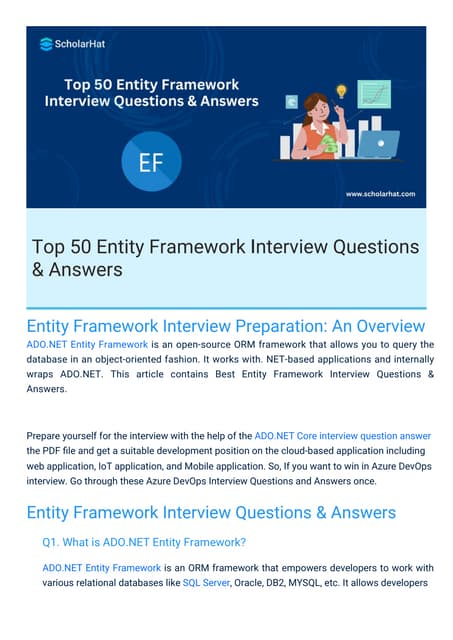



Entity Framework Interview Questions PDF By ScholarHatScholarhat
╠²
Entity Framework Interview Questions PDF By ScholarHatInterim Guidelines for PMES-DM-17-2025-PPT.pptx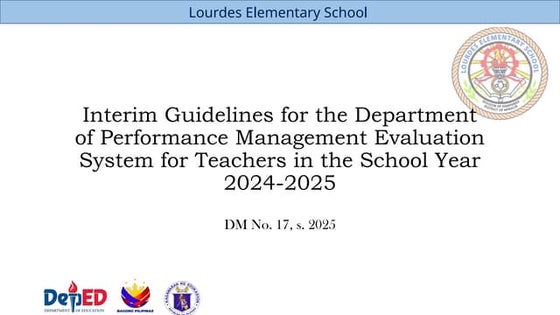



Interim Guidelines for PMES-DM-17-2025-PPT.pptxsirjeromemanansala
╠²
This is the latest issuance on PMES as replacement of RPMS. Kindly message me to gain full access of the presentation. Dr. Ansari Khurshid Ahmed- Factors affecting Validity of a Test.pptx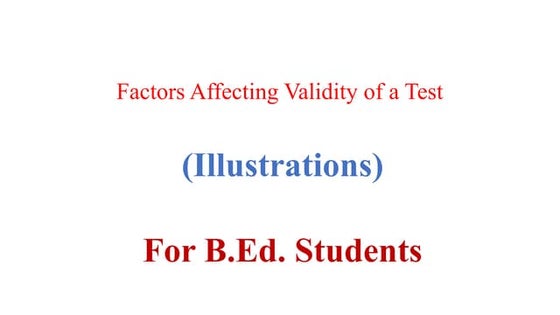



Dr. Ansari Khurshid Ahmed- Factors affecting Validity of a Test.pptxKhurshid Ahmed Ansari
╠²
Validity is an important characteristic of a test. A test having low validity is of little use. Validity is the accuracy with which a test measures whatever it is supposed to measure. Validity can be low, moderate or high. There are many factors which affect the validity of a test. If these factors are controlled, then the validity of the test can be maintained to a high level. In the power point presentation, factors affecting validity are discussed with the help of concrete examples.Blind spots in AI and Formulation Science, IFPAC 2025.pdf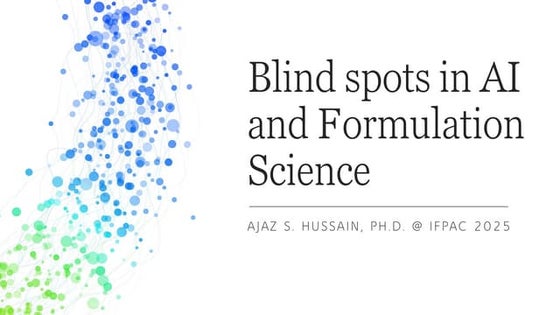



Blind spots in AI and Formulation Science, IFPAC 2025.pdfAjaz Hussain
╠²
The intersection of AI and pharmaceutical formulation science highlights significant blind spotsŌĆösystemic gaps in pharmaceutical development, regulatory oversight, quality assurance, and the ethical use of AIŌĆöthat could jeopardize patient safety and undermine public trust. To move forward effectively, we must address these normalized blind spots, which may arise from outdated assumptions, errors, gaps in previous knowledge, and biases in language or regulatory inertia. This is essential to ensure that AI and formulation science are developed as tools for patient-centered and ethical healthcare.Intellectual Honesty & Research Integrity.pptx



Intellectual Honesty & Research Integrity.pptxNidhiSharma495177
╠²
Research Publication & Ethics contains a chapter on Intellectual Honesty and Research Integrity.
Different case studies of intellectual dishonesty and integrity were discussed.Helping Autistic Girls Shine Webinar ║▌║▌▀Żs



Helping Autistic Girls Shine Webinar ║▌║▌▀ŻsPooky Knightsmith
╠²
For more information about my speaking and training work, visit: https://www.pookyknightsmith.com/speaking/Year 10 The Senior Phase Session 3 Term 1.pptx



Year 10 The Senior Phase Session 3 Term 1.pptxmansk2
╠²
Year 10 The Senior Phase Session 3 Term 1.pptxASP.NET Web API Interview Questions By Scholarhat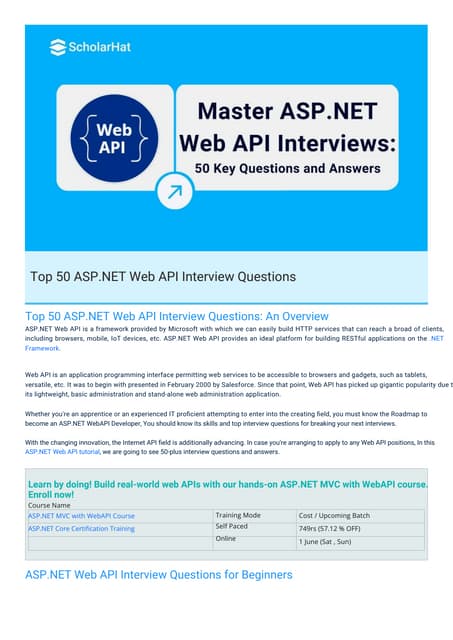



ASP.NET Web API Interview Questions By ScholarhatScholarhat
╠²
ASP.NET Web API Interview Questions By ScholarhatOne Click RFQ Cancellation in Odoo 18 - Odoo ║▌║▌▀Żs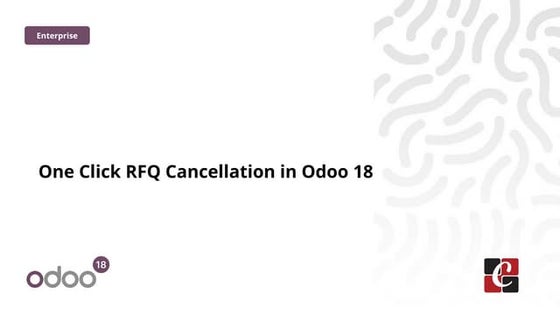



One Click RFQ Cancellation in Odoo 18 - Odoo ║▌║▌▀ŻsCeline George
╠²
In this slide, weŌĆÖll discuss the one click RFQ Cancellation in odoo 18. One-Click RFQ Cancellation in Odoo 18 is a feature that allows users to quickly and easily cancel Request for Quotations (RFQs) with a single click.How to Configure Deliver Content by Email in Odoo 18 Sales



How to Configure Deliver Content by Email in Odoo 18 SalesCeline George
╠²
In this slide, weŌĆÖll discuss on how to configure proforma invoice in Odoo 18 Sales module. A proforma invoice is a preliminary invoice that serves as a commercial document issued by a seller to a buyer.Unit 1 Computer Hardware for Educational Computing.pptx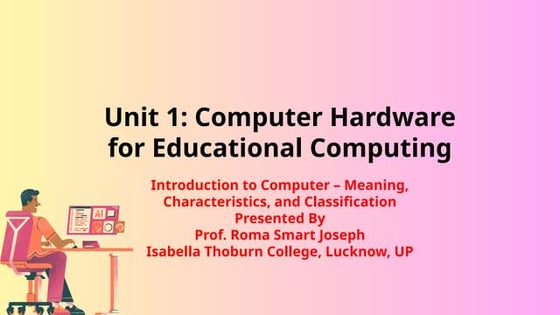



Unit 1 Computer Hardware for Educational Computing.pptxRomaSmart1
╠²
Computers have revolutionized various sectors, including education, by enhancing learning experiences and making information more accessible. This presentation, "Computer Hardware for Educational Computing," introduces the fundamental aspects of computers, including their definition, characteristics, classification, and significance in the educational domain. Understanding these concepts helps educators and students leverage technology for more effective learning.Meeting the needs of modern students?, Selina McCoy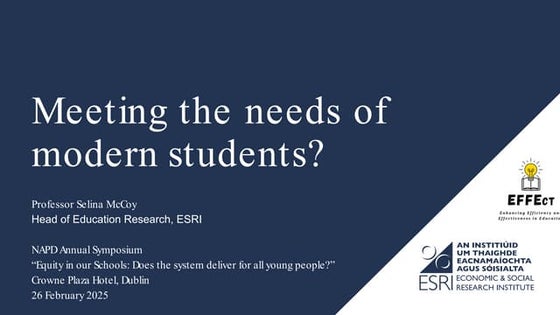



Meeting the needs of modern students?, Selina McCoyEconomic and Social Research Institute
╠²
NAPD Annual Symposium
ŌĆ£Equity in our Schools: Does the system deliver for all young people?ŌĆØMastering Soft Tissue Therapy & Sports Taping



Mastering Soft Tissue Therapy & Sports TapingKusal Goonewardena
╠²
Mastering Soft Tissue Therapy & Sports Taping: Pathway to Sports Medicine Excellence
This presentation was delivered in Colombo, Sri Lanka, at the Institute of Sports Medicine to an audience of sports physiotherapists, exercise scientists, athletic trainers, and healthcare professionals. Led by Kusal Goonewardena (PhD Candidate - Muscle Fatigue, APA Titled Sports & Exercise Physiotherapist) and Gayath Jayasinghe (Sports Scientist), the session provided comprehensive training on soft tissue assessment, treatment techniques, and essential sports taping methods.
Key topics covered:
Ō£ģ Soft Tissue Therapy ŌĆō The science behind muscle, fascia, and joint assessment for optimal treatment outcomes.
Ō£ģ Sports Taping Techniques ŌĆō Practical applications for injury prevention and rehabilitation, including ankle, knee, shoulder, thoracic, and cervical spine taping.
Ō£ģ Sports Trainer Level 1 Course by Sports Medicine Australia ŌĆō A gateway to professional development, career opportunities, and working in Australia.
This training mirrors the Elite Akademy Sports Medicine standards, ensuring evidence-based approaches to injury management and athlete care.
If you are a sports professional looking to enhance your clinical skills and open doors to global opportunities, this presentation is for you.ASP.NET Interview Questions PDF By ScholarHat



ASP.NET Interview Questions PDF By ScholarHatScholarhat
╠²
ASP.NET Interview Questions PDF By ScholarHatComprehensive Guide to Antibiotics & Beta-Lactam Antibiotics.pptx



Comprehensive Guide to Antibiotics & Beta-Lactam Antibiotics.pptxSamruddhi Khonde
╠²
¤ōó Comprehensive Guide to Antibiotics & Beta-Lactam Antibiotics
¤ö¼ Antibiotics have revolutionized medicine, playing a crucial role in combating bacterial infections. Among them, Beta-Lactam antibiotics remain the most widely used class due to their effectiveness against Gram-positive and Gram-negative bacteria. This guide provides a detailed overview of their history, classification, chemical structures, mode of action, resistance mechanisms, SAR, and clinical applications.
¤ōī What YouŌĆÖll Learn in This Presentation
Ō£ģ History & Evolution of Antibiotics
Ō£ģ Cell Wall Structure of Gram-Positive & Gram-Negative Bacteria
Ō£ģ Beta-Lactam Antibiotics: Classification & Subtypes
Ō£ģ Penicillins, Cephalosporins, Carbapenems & Monobactams
Ō£ģ Mode of Action (MOA) & Structure-Activity Relationship (SAR)
Ō£ģ Beta-Lactamase Inhibitors & Resistance Mechanisms
Ō£ģ Clinical Applications & Challenges.
¤ÜĆ Why You Should Check This Out?
Essential for pharmacy, medical & life sciences students.
Provides insights into antibiotic resistance & pharmaceutical trends.
Useful for healthcare professionals & researchers in drug discovery.
¤æē Swipe through & explore the world of antibiotics today!
¤öö Like, Share & Follow for more in-depth pharma insights!Educators as Game Designers Workshop - 1
- 1. EDUCATORS AS GAME DESIGNERS Dr. Bernard Bull @BernardBull Bernard.Bull@cuw.edu
- 2. What is a Game?
- 3. What is a Game? "When you strip away the genre differences and the technological complexities, all games share four defining traits: a goal, rules, a feedback system, and voluntary participation.ŌĆ£ ŌĆō Jane McGonigal
- 5. A friend and the flight simulator
- 6. ŌĆ£...how many educators are able to keep the undivided attention of 5th graders multiple hours straight without a break...and yet video games manage to do so...ŌĆØ
- 7. Four Distinct Categories ŌĆó Games in Education ŌĆó Repurposing non-educational games for educational purposes ŌĆó Gameful Learning ŌĆó Taking inspiration from ŌĆ£how good games function ŌĆó Gamification ŌĆó Using game features in non-game environments ŌĆó Game-based Learning ŌĆó Designing games that are intended to achieve one or more learning goals
- 8. Four Distinct Categories ŌĆó Games in Education - Minecraft ŌĆó Repurposing non-educational games for educational purposes ŌĆó Gameful Learning ŌĆó Taking inspiration from ŌĆ£how good games function - Gradecraft ŌĆó Gamification ŌĆó Using game features in non-game environments - Fitbit ŌĆó Game-based Learning ŌĆó Designing games that are intended to achieve one or more learning goals - Politicraft
- 9. ŌĆó Constant Feedback in Easy to Understand Formats ŌĆó It DoesnŌĆÖt Choose the Goals forYou ŌĆó It Suggests Goals By Rewarding Certain Accomplishments ŌĆó It DoesnŌĆÖtTellYou How to Step,When to Step, orWhere to Step ŌĆó The Online System Facilitates User-generated Interest Groups ŌĆó The Online System Has a Built-in Space for Journaling
- 10. Why does Fitbit work?
- 11. What are the game features that make Angry Birds engaging?
- 12. ŌĆó Set a Clear Goal and Expect 100% Mastery ŌĆó Reward Reaching the Goal with a New Challenge ŌĆó Allow an Unlimited Number of Attempts ŌĆó Provide the Player/Learner with the Flexibility of Reaching the Same Goal ŌĆó Provide FeedbackThat Goes Beyond SimplyWhether or NotYourAchieved the Baseline Goal at Using Different Strategies ŌĆó Blend Repetition with Novelty &Variety ŌĆó Engage Multiple Senses ŌĆó Scaffold the Challenges, but Provide Easy Stages for Review ŌĆó Performance on the Original Baseline Goal Is ConstantThroughout the Game ŌĆó You Can Replay Any PastTheme
- 13. Why do games keep people so engaged?
- 14. Games and Learning ŌĆó Learning by doing ŌĆó Learning by thinking and strategizing ŌĆó Learning by collaborating ŌĆó Learning by establishing shared values ŌĆó Learning by persistent engagement ŌĆó Learning by experiencingŌĆ”being immersed in a role, being bound to the rules and values of an environment (situated learning!)
- 15. Mih├Īly Cs├Łkszentmih├Īlyi - Flow 1. Clear goals 2. High concentration on a limited area 3. Losing yourself in the activity 4. Lose track of time 5. Direct and immediate feedback Cs├Łkszentmih├Īlyi, M. (1996), Creativity: Flow and the Psychology of Discovery and Invention, New York: Harper.
- 16. Mih├Īly Cs├Łkszentmih├Īlyi - Flow 6. Not too hard and not too easy 7. Sense that, ŌĆ£I am in control of the situation.ŌĆØ 8. Intrinsically rewarding 9. DonŌĆÖt notice bodily needs 10. Absorbed and fully focused on a specific activity Cs├Łkszentmih├Īlyi, M. (1996), Creativity: Flow and the Psychology of Discovery and Invention, New York: Harper.
- 17. Technology is Optional ŌĆó Mock court room ŌĆó Play the role of scientists studying the local wetlands and giving a report to the town board ŌĆó Newspaper staff serving different roles that help them learn about photography, editing, writing, etc.
- 18. What if I want to create my own educational simulation?
- 20. Killers hit people with them. Diamonds are always seeking treasure. Explorers dig around for information. Socializers empathize with other players. Richard Bartle (1996), "Hearts, Clubs, Diamonds, Spades: Players Who suit MUDs," http://www.mud.co.uk/richard/hcds.htm What Type of Gamer are You? - http://www.neowin.net/forum/topic/792082-bartle-gamer-psychology-quiz-what-kind-of-gamer-are-you/
- 21. Gamified Learning Questions for Educators 1. How can I make the learning pleasantly frustrating? 2. What if I gave quests and challenges instead of assignments? 3. What if I created a plan for constant and frequent feedback apart from grading? 4. What if I gave experience points, badges or titles to recognize achievement? 5. What if I rewarded success with a more difficult challenge? 6. What if I rewarded risk-taking, creativity, experimentation and strategic thinking? 7. What if I gave the learner/player the ability to customize the learning experience to match their needs, preferences and style? 8. What if I require the learner/player to take constant action? 9. What if I expected learners to preform their way to competence? 10. What if I aimed for flow?
- 22. The Future 1. Video games / simulations will have a significant impact upon learning in the next 5 years that will be verified by hard data. 2. Games and simulations will transform learning in the next 10-15 years. 3. Institutions prepared to develop and use these simulations will have an edge. 4. There will be need to teach with, develop, and learn from these games and simulations.
- 23. ŌĆ£Our whole life is solving puzzles.ŌĆØ -Erno Rubik
- 24. EDUCATORS AS GAME DESIGNERS Dr. Bernard Bull @BernardBull Bernard.Bull@cuw.edu

